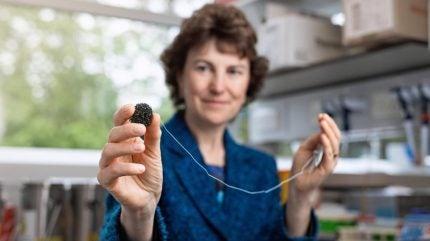
A pivotal investigator-led clinical trial for a new ‘pill-on-a-thread’ innovation for oesophageal cancer screening has welcomed its first patients, Cambridge Cancer Research Hospital announced yesterday (28 November).
The BEST4 screening trial (ISRCTN85044808) will determine whether Medtronics Cytosponge-TFF3, a capsule sponge device, could become a new screening programme for Barrett’s oesophagus, a condition that can lead to oesophageal cancer.

Discover B2B Marketing That Performs
Combine business intelligence and editorial excellence to reach engaged professionals across 36 leading media platforms.
Over the next three years, the trial will recruit 120,000 patients who currently take medication for heartburn, which is the most common symptom of Barrett’s oesophagus. It is open to men over the age of 55 and women over the age of 65 who take medication for chronic heartburn.
Eligible patients will be asked to join Heartburn Health – a new platform supporting clinical trial participation in heartburn-linked cancers – via a text message from NHS Research. They will then be able to attend one of the mobile screening vans, which will be stationed across England.
The capsule sponge test only lasts around ten minutes and can be conducted by a nurse, making it a faster, cheaper and less invasive screening method than endoscopies. Patients swallow a small, gelatine capsule attached to a string, which dissolves in the stomach within seven minutes. This releases the sponge, which expands to the size of a 50p coin.
As it is gently pulled out, the sponge collects oesophageal cells, which are subsequently sent for testing for two proteins: Trefoil Factor 3 (TFF3) and altered p53 protein. The former indicates only Barrett’s oesophagus, whilst the presence of the latter is used in the identification of oesophageal cancer.

US Tariffs are shifting - will you react or anticipate?
Don’t let policy changes catch you off guard. Stay proactive with real-time data and expert analysis.
By GlobalDataThe study will be led by Cambridge University Hospitals NHS Foundation Trust and the University of Cambridge. The trial was designed by the Cancer Research UK Cancer Prevention Trials Unit at Queen Mary University of London (QMUL), which will also analyse the results.
The BEST4 Screening trial is running concurrently with the BEST 4 surveillance trial (ISRCTN88972567), which was launched at Addenbrooke’s in January. The trials follow the BEST3 study (ISRCTN68382401), which showed the capsule sponge picked up ten times as many cases of Barrett’s oesophagus in people with chronic heartburn, compared to routine GP care.
Currently, more than 24,000 capsule sponge tests have been performed in pilot programmes. These have helped to reduce diagnostic backlogs in endoscopy and NHS pathology.
The ‘pill-on-a-thread’ itself was designed by Rebecca Fitzgerald, director of the Early Cancer Institute at the University of Cambridge and honorary consultant in cancer medicine at Addenbrooke’s Hospital.
Speaking about the device, Fitzgerald said: “The capsule sponge is changing how we detect Barrett’s oesophagus and oesophageal cancer. Catching it earlier can save lives by reducing the need for chemotherapy and surgery to remove the oesophagus.
“The BEST4 Screening trial is the pinnacle of many years of painstaking research, which has demonstrated that the capsule sponge can reliably identify Barrett’s oesophagus. Thousands of people have already benefited in trials and pilot programmes, and now we’re taking the test to the next level to see if we could offer this to everyone with heartburn.”
Along with other clinical trials testing safety and efficacy, the BEST3 trial was funded by Cancer Research UK. The charity is working with National Institute for Health and Cancer Research (NIHR), to provide £6.4m in funding to the BEST4 trial.
Cancer Research UK reports that there are around 9,300 new cases of oesophageal cancer annually in the UK. Causing around 22 deaths a day, it is the UK’s seventh most deadly cancer.





